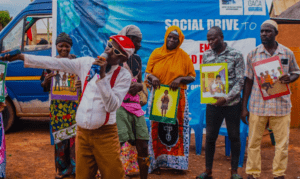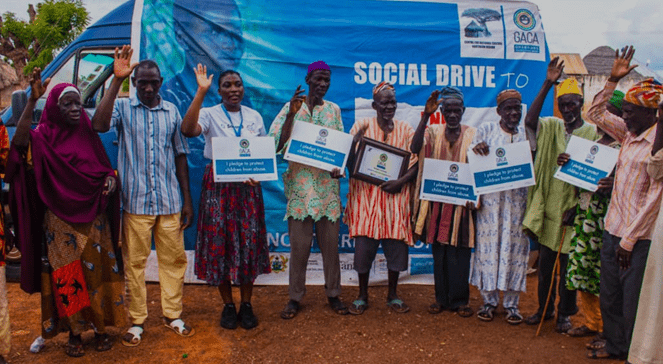By Samuel SAM
The United Nations International Children’s Emergency Fund (UNICEF), in collaboration with Ghanaians Against Child Abuse (GACA), has held a mobile theatre programme to advocate against practices that retard the development of children in Northern Ghana.

It was also to educate the public on need to champion children’s development. The event was organised by the Centre for National Culture (CNC) Northern Region – with drama dubbed ‘For Our Bright Future, End Child Marriage Now’ written by Madam Antoinette Dzorgbenyuie Kotoko-Letsa, a playwright.
It was held in the Northern, North East, Savannah, Upper East, Upper West, Western, Western North, Central and Volta Regions.
In the Northern Region, the drama was performed in Dagbanli at eight communities: namely Dabogshei, Nlalaayili, Kpana and Tunaayili from the Tolon district; and Dufaa, Gukpua Tua, Salaamba and Gbambaya from the Tamale metropolitan area.
Themes in the dramas were based on child-marriage, hand hygiene and personal hygiene, sexual abuse, child abuse of verbal and non-verbal nature, child neglect, importance of education and skills training, and child labour through child-marriage.

Others were HIV Education, child rights, inclusive education for all children – both males and females, acquisition of birth-certificates for children at birth, drug abuse, insecticide Treated Nets (ITN) use to prevent malaria, antenatal care, the role of Traditional birth attendants in partnership with Ghana Health Service, and immunising children at the right ages.
It brought together stakeholders from the Department of Community Development and Social Welfare (DCDSW), Ghana Health Service, Department of Children, Ghana Education Service, Northern Sector Action on Awareness Centre – (NORSAAC) and Savvanah Signatures-Tamale, while monitoring and evaluation was done from Monday 4th to Wednesday 6th November 2024.
In the drama, Teacher Jilma washes his hands with soap under running water using a Tippy Tap – a locally-made handwashing device – after visiting a household toilet facility. He articulates benefits of the tippy tap as he demonstrates its use and washes his hands in the proper way. Mba Faako’s neglect of his responsibilities as a husband to his wife Mma Saha and father to his children, Wuntima and Sagtiti ,led to the children going astray.
Mba Faako paid no attention to the well-being of his children but rather focused on giving his twelve-year old daughter, Wuntima, to Alhaji Inusah in marriage. Wuntima’s brother, Sagtiti, abused drugs and indulged in smoking, drinking and dating young girls.
While Wuntima is in her marital home she is physically, sexually, verbally and emotionally abused by her husband, and also battered by her rival (the senior wife) as she continues performing household chores under duress – such as doing laundry for her rival, husband and herself in a state of being heavily pregnant and very sick. She also washes clothing for community folks to earn money to support herself and her children.
Some opinion leaders and community members expressed gratitude to UNICEF and CNC for the advocacy and pledged to stop practices that risk the lives of their children and the community at large.
An officer at the Department of Community Development and Social Welfare, Mma Salma, assured to revisit her academic dreams of becoming a mathematics teacher.
At Dabogshei Community, Tolon district, an elder, Mr. Zakaria Adam – whose daughter got impregnated in school and gave birth but was made to stay home because they thought that was the end of her education – after watching the drama saw the need to let his daughter return to school. “My daughter is currently enrolled in a community school,” he said.
Mr. Alhassan Ziblim from Dabogshie encouraged others to install the tippy tap in their homes to improve their healthcare.
Acting Deputy Director-CNC for Northern Region, Mad. Kotoko-Letsa appealed to chiefs and elders of the communities to encourage the young girls who have travelled south in search of menial jobs to return home and further their education.










